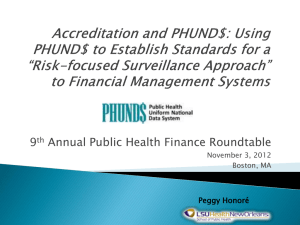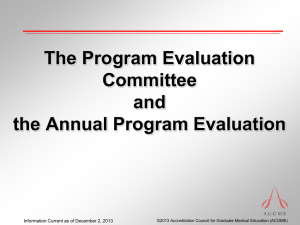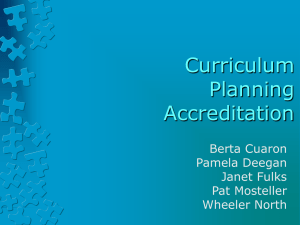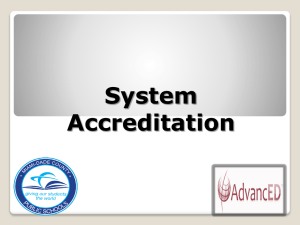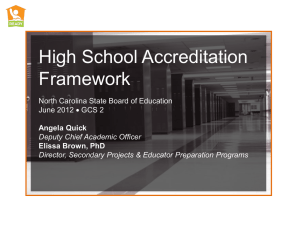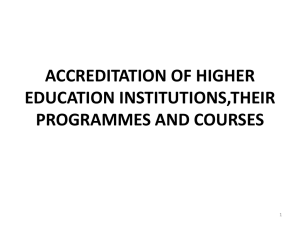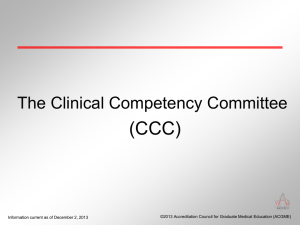CEMSFD ACGME Pres Jan 2014 - Carter and Ling
advertisement
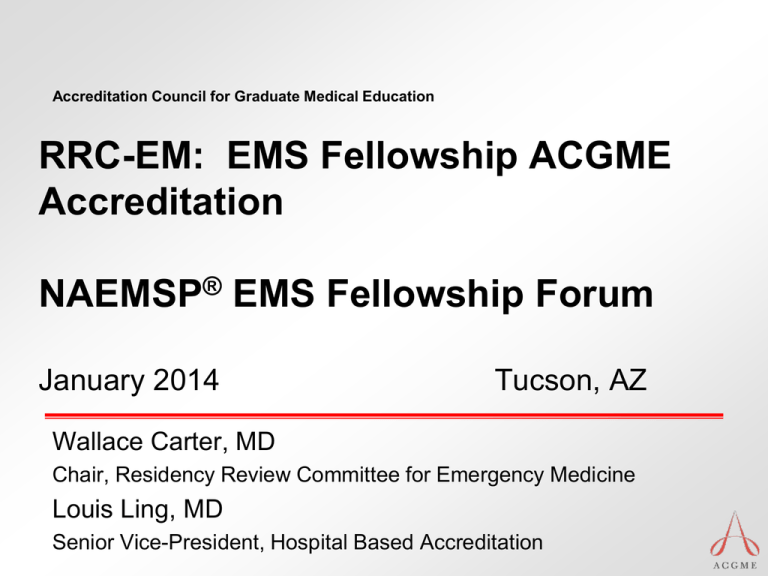
Accreditation Council for Graduate Medical Education RRC-EM: EMS Fellowship ACGME Accreditation NAEMSP® EMS Fellowship Forum January 2014 Tucson, AZ Wallace Carter, MD Chair, Residency Review Committee for Emergency Medicine Louis Ling, MD Senior Vice-President, Hospital Based Accreditation Disclosure Carter: New York Presbyterian Columbia University and Weill Cornell Ling: Hennepin County Medical Center University of Minnesota Textbooks: Rosen, Harwood-Nuss © 2012 Accreditation Council for Graduate Medical Education (ACGME) Learning Objectives • Next Accreditation System (NAS) • Quick Review • Update and New Developments • EMS Specific Information • Introduction to Self-Study Visits © 2012 Accreditation Council for Graduate Medical Education (ACGME) NAS The Next Accreditation System: A quick review What is the NAS and when does it start? • The Next Accreditation System began July 1, 2013 for all core EM and EM subspecialty programs • NAS Strategic Plan: • Foster innovation and improvement in the learning environment • Increase the accreditation emphasis on educational outcomes • Increase efficiency and reduce burden in accreditation • Improve communication and collaboration with key internal and external stakeholders © 2012 Accreditation Council for Graduate Medical Education (ACGME) The Building Blocks of The Next Accreditation System Self Study Institutional Review prn Site Visits (Program or Institution) Continuous RRC Oversight and Accreditation Sponsor Oversight CLER Visits © 2012 Accreditation Council for Graduate Medical Education (ACGME) NAS • Instead of biopsies, annual data collection • • • • • Trends in key performance measurements Milestones, Residents, fellows and faculty survey Scholarly activity template Operative & case log data Board pass rates • Scheduled accreditation visits every 10 years • Focused site visits if annual data trends suggest problems • PIF replaced by self-study © 2012 Accreditation Council for Graduate Medical Education (ACGME) NAS and ADS Annual Updates • Each year, programs data will be required to entered in ADS such as: • • • • • • • Faculty information Fellow information Block diagrams/curricular information Scholarly activity information Participating site information Responses to previous citations Duty Hour, Patient Safety and Learning Environment information • Evaluation information • Reporting of major changes in the program © 2012 Accreditation Council for Graduate Medical Education (ACGME) All 9,022 ACGME Accredited Residency and Fellowship Programs* January 1, 2013 * Excludes programs with Initial Accreditation © 2012 Accreditation Council for Graduate Medical Education (ACGME) @ 2013 Accreditation Council for Graduate Medical Education (ACGME) All 9,022 ACGME Accredited Residency and Fellowship Programs* January 1, 2013 95.7% 4% 0.3%, n=27 * Excludes programs with Initial Accreditation © 2012 Accreditation Council for Graduate Medical Education (ACGME) @ 2013 Accreditation Council for Graduate Medical Education (ACGME) NAS • Ongoing data collection and trend analysis • Enhance oversight to ensure high quality education and a safe and effective learning environment • High-quality programs will be freed to innovate – detailed process standards • Programs with continued accreditation in good standing will not have to demonstrate compliance with the “detail” program requirements as written, but are allowed to innovate © 2012 Accreditation Council for Graduate Medical Education (ACGME) What are core, detail and outcome program requirements? • Core Requirements: Statements that define structure, resource, or process elements essential to every graduate medical educational program. • Detail Requirements: Statements that describe a specific structure, resource, or process, for achieving compliance with a Core Requirement. Programs in substantial compliance with the Outcome Requirements may utilize alternative or innovative approaches to meet Core Requirements. • Outcome Requirements: Statements that specify expected measurable or observable attributes (knowledge, abilities, skills, or attitudes) of residents or fellows at key stages of their graduate medical education. © 2012 Accreditation Council for Graduate Medical Education (ACGME) What are core, detail and outcome program requirements? • II.A.2. Qualifications of the program director must include: • II.A.2.b) current certification in the subspecialty by the American Board of Emergency Medicine, or specialty qualifications that are acceptable to the Review Committee; and, (Core) • II.A.2.d) at least three years’ experience as a core physician faculty member in an ACGME-accredited emergency medicine program or emergency medical services program; (Detail) • IV.A.2.a).(2).(b).(i) participation in a mass casualty/disaster triage at an actual event or drill; (Outcome) © 2012 Accreditation Council for Graduate Medical Education (ACGME) Do I have to adhere to the “detail” program requirements? • Programs that have initial accreditation or are in trouble must demonstrate compliance with all “detail” program requirements as written. • Programs that have continued accreditation will be allowed to “innovate” on those program requirements that are identified as “detail”. © 2012 Accreditation Council for Graduate Medical Education (ACGME) Trended Data Elements Annual ADS Update Program Attrition – Changes in PD/Core Faculty/Residents Program Characteristics – Structure and Resources Scholarly Activity Board Pass Rate – Rolling Rates Resident Survey – Common and Specialty Elements Clinical Experience – Case Logs or other Faculty Survey – Core Faculty Semi-Annual Resident Evaluation and Feedback Milestones Annual Sponsor Site Visit (CLER) © 2012 Accreditation Council for Graduate Medical Education (ACGME) Annual evaluation of program outcome data (modified from TJN) Applications for New Programs Accreditation with Warning Continued Accreditation Initial Accreditation Structure Structure Core Process Core Process Detailed Process Detailed Process Outcomes Outcomes STANDARDS Structure Core Process Detail Process Adverse Actions Outcomes Structure Core Process Detailed Process Outcomes Initial Accreditation (IA) Fellowships • Fellowship applications are reviewed without a site visit. Within 2 years of granting IA, a site visit will be scheduled • RRC options when reviewing application • Initial Accreditation • Withhold • RRC options following IA site visit • Continued Accreditation • Initial Accreditation with Warning – 1 year only • Withdrawal © 2012 Accreditation Council for Graduate Medical Education (ACGME) Site Visits • Focused: isolated concern about data elements • Full: for IA or general concern about program, more than one isolated issue • • • • No PIF to prepare Issues will be known for focus 30 day notice Teams for larger than 4 residents/fellows • Self-studies after 2015 © 2012 Accreditation Council for Graduate Medical Education (ACGME) Adverse Actions: What has changed • No proposed adverse actions • Adverse accreditation status can only be conferred following a site visit • Programs with adverse accreditation status cannot request an increase in resident complement • Probation cannot exceed 2 consecutive annual reviews © 2012 Accreditation Council for Graduate Medical Education (ACGME) Adverse Actions: What hasn’t changed • A program on Withdrawal can complete the current academic year • With RRC approval can complete 1 more year • No new residents can be appointed • If program re-applies within 2 years, they must address previous citations • A site visit is needed for all applications following a withdrawal © 2012 Accreditation Council for Graduate Medical Education (ACGME) Relationship of Core and Subs Fellowships must have a relationship with a core residency program • Self-study visits of core and associated fellowships will occur at the same time • Adverse action in core results in the same status for their associated fellowships • Withdrawal of core means withdrawal of all associated fellowships • New fellowships can only be granted IA status if core status is Continued Accreditation • NO attached programs can be on Probation or in appeal © 2012 Accreditation Council for Graduate Medical Education (ACGME) NAS Building the case for milestones……… Defer to Laura Edgar, EdD © 2012 Accreditation Council for Graduate Medical Education (ACGME) Accreditation Council for Graduate Medical Education RRC-EM: EMS Fellowship ACGME Accreditation NAEMSP® EMS Fellowship Forum January 2014 Tucson, AZ Wallace Carter, MD Chair, Residency Review Committee for Emergency Medicine Louis Ling, MD Senior Vice-President, Hospital Based Accreditation New Application Process as of July 1, 2013 • All new program applications must be initiated in ADS by the DIO of your institution © 2012 Accreditation Council for Graduate Medical Education (ACGME) New Application Process as of July 1, 2013 • The program director must complete 2 parts • Part 1 – Complete the ADS electronic portion initiated by the DIO • Part 2 – Download and complete the new application specialty specific Word document from the website and upload into ADS • The completed application is submitted electronically in ADS © 2012 Accreditation Council for Graduate Medical Education (ACGME) New Application Process as of July 1, 2013 • The new application specialty specific Word document can be found on the ACGME EM Web page: http://www.acgme.org/acgmeweb/tabid/131/ProgramandInstitutionalAccreditation/Hos pital-BasedSpecialties/EmergencyMedicine.aspx © 2012 Accreditation Council for Graduate Medical Education (ACGME) Information: RC-EM Web Page Recommended Links • • • • Program Requirements: Currently In Effect New Applications – Word documents FAQs Common Resources: • ACGME Glossary of Terms • Apply for Accreditation in Eight Easy Steps • Program Director Guide to Common Program Requirements • Program Directors’ Virtual Handbook © 2012 Accreditation Council for Graduate Medical Education (ACGME) Faculty Roster • When completing the faculty roster in ADS, enter core EMS faculty that have at least 5 hours per week and any other nonEMS physicians who provide at least 10 hours per week © 2012 Accreditation Council for Graduate Medical Education (ACGME) Faculty Qualifications • If faculty members are ABOEM boarded and obtain the specialty certificate in EMS from the ABOEM, does the RC view this as being “acceptable”? • A CAQ in EMS by the ABOEM is viewed as being acceptable © 2012 Accreditation Council for Graduate Medical Education (ACGME) For Requested Positions, can I ask for a range, e.g. 1-2? • The RC-EM does not accept ranges of positions, only a specific number, so instead of requesting 1-2 position, you should request 2 positions (you are not required to fill all positions). • You need to demonstrate in your application that you have enough resources to support the number of fellows requested. (e.g. you would need to have enough opportunity to have each fellow lead a disaster drill if that is part of your program so you provide the same experience for both fellows.) © 2012 Accreditation Council for Graduate Medical Education (ACGME) How do I know if I need a PLA? • Here is an FAQ regarding Master Affiliation Agreements and PLAs. There is a PLA template at the end of the document/site: http://www.acgme.org/acgmeweb/Portals/0/PDFs/F AQ/ab_FAQAgreement.pdf • Program letters of agreement originate at the program (instead of the institutional) level and are required for each participating site providing a required assignment. • Program letters of agreement are required between the residency program and all sites to which residents rotate for required education or assignments. © 2012 Accreditation Council for Graduate Medical Education (ACGME) How do I know if I need a PLA? However, if the two sites operate essentially as one entity, that is, they are governed by one governing body (e.g. Board of Directors) neither a master affiliation agreement nor a program letter of agreement would be necessary. Program letters of agreement are not necessary if the following on-campus or off-campus site is under the governance of the sponsoring institution or is an office of a physician who is a member of the sponsoring institution’s teaching faculty/medical staff: nursing and assisted-living homes; hospice facilities; faculty patient care offices; private physicians’ offices (volunteer faculty); ambulatory surgical centers; diagnostic centers, e.g. imaging, laboratory, etc.; treatment centers, e.g. dialysis, rehabilitation, chemotherapy, etc.; other similar sites. © 2012 Accreditation Council for Graduate Medical Education (ACGME) New EMS FAQ for PLAs Question When is it necessary for a program to obtain a Program Letter of Agreement (PLA) with an EMS agency? [Program Requirement I.B.1] © 2012 Accreditation Council for Graduate Medical Education (ACGME) New EMS FAQ for PLAs Answer: There must be a program letter of agreement (PLA) between the program and each participating site providing a required assignment. A fellow may interact with a number of EMS agencies in different capacities. The Review Committee guidelines on PLAs specify: • A PLA is required for any EMS agencies with which the fellow provides in person participation as part of the required curriculum • If the sponsoring institution owns the company, no PLA is needed. • If the participating site is an independent company, a PLA is still needed for liability reasons even if the program director or a faculty member of the EMS program is the medical director (and is signing the document on behalf of the program and on behalf of the participating site) at the participating site/independent company. © 2012 Accreditation Council for Graduate Medical Education (ACGME) Medical School Letter of Understanding I.B.6. The program must be affiliated with a medical school. I.B.6.a) The program must have a written letter of understanding which documents the duties and responsibilities of both the medical school and the program. This is similar to an affiliation agreement. May state that the program will be compliant with the regulations and rules of the institution in matters related to the functioning of the program and that the institution will provide appropriate oversight to assure compliance with accreditation standards as well as hospital and state rules, regulations and laws See the following web page for more information: https://www.acgme.org/acgmeweb/Portals/0/PDFs/FAQ/ab_FAQAgree ment.pdf © 2012 Accreditation Council for Graduate Medical Education (ACGME) Information: Application Deadline • Applications received by April 28th, 2014 will be reviewed at the June 23-24, 2014 RC Meeting Information: Application Review Process • Completed application and all attachments uploaded in ADS • No site visit required • Application reviewed based upon program requirements at an upcoming RC meeting. • In 2014 RC meets February and June • Programs are not reviewed by RC members in same state or with a conflict of interest © 2012 Accreditation Council for Graduate Medical Education (ACGME) Information: Application Review Process • Within 5 business days after the meeting, emails will be sent regarding the RC’s decision • Initial Accreditation OR Withhold • Within 60 days after the meeting, a Letter of Notification (LON) will be available. © 2012 Accreditation Council for Graduate Medical Education (ACGME) Initial Accreditation: EMS Effective Dates EMS Program Requirements were approved and were given an effective date of 9/30/2012 For applications reviewed at both the February and June 2014 meetings and granted initial accreditation, programs may choose to have an effective date of either 7/1/2013 or 7/1/2014. © 2012 Accreditation Council for Graduate Medical Education (ACGME) What about current EMS fellows? Q) If my program is • If they finish the accredited at the program on or before February 2014 RC June 30, 2014, they meeting and I chose will not graduate from an effective date of an accredited July 1, 2014, what program and will be does that mean for my ineligible to take current fellows ABEM’s EMS CAQ scheduled to finish exam. June 30, 2014? EMS Applications Reviewed • 24 applications reviewed in February 2013 • 13 applications reviewed in September 2013 • 6 applications scheduled for February 2014 33/37 - Total EMS applications approved to date © 2012 Accreditation Council for Graduate Medical Education (ACGME) Top 3 Most Common EMS Citations • Lack of PLAs • PD responsibility – Inaccurate Application Form • Scholarly Activity – Core faculty © 2012 Accreditation Council for Graduate Medical Education (ACGME) Self Study & Program Improvement ACGME self study visits begin 2015 Fellowships will be reviewed with their core programs Tool for program improvement Individualized Learning Plan (ILP) on steroids © 2012 Accreditation Council for Graduate Medical Education (ACGME) Self Study & Program Improvement NOT A PIF Tool for improvement Regular goal setting Longer term: 3-5 years Includes self-reflection/self-study Consider SWOT (strengths/weaknesses/ opportunities and threats)/stakeholders Consider program outcome trends Don’t have to wait until ACGME announces visit © 2012 Accreditation Council for Graduate Medical Education (ACGME) Questions?? © 2012 Accreditation Council for Graduate Medical Education (ACGME)
